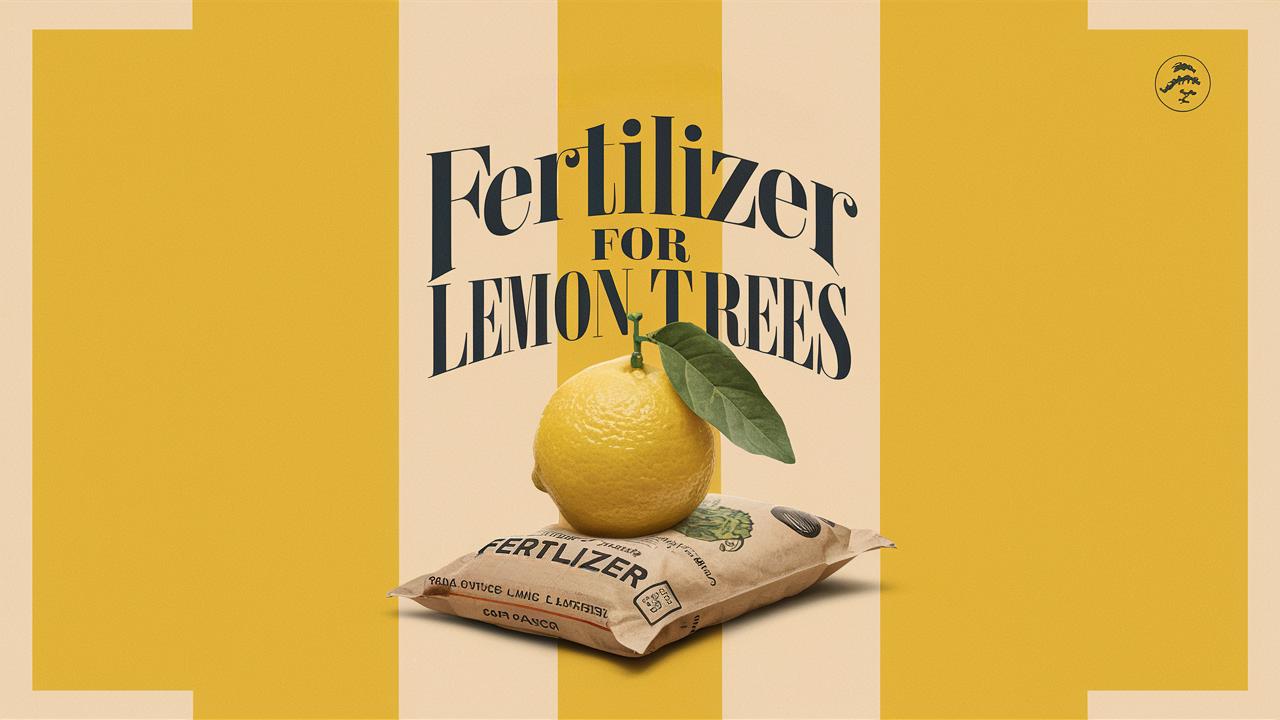In this comprehensive guide, we will unravel the intricacies of fertilizing lemon trees, offering in-depth insights that cater to both novice and experienced gardeners.
Fertilizer For Lemon Trees
| Image | Name | Rating | Shop |
|---|---|---|---|
 | Citrus-tone Fertilizer |  | |
 | Farmer’s Secret Plant Food |  | |
 | GardenWise |  |
Citrus-tone Fertilizer
The Espoma Organic Citrus-Tone 5-2-6 Natural & Organic Fertilizer and Plant Food is a great option for lemon trees, as well as other citrus, fruit, nut, and avocado trees. This fertilizer is made with a blend of natural and organic ingredients, including the Bio-tone formula, which enhances its effectiveness.
This fertilizer is easy to use – simply apply it around the drip line of the tree in late winter or spring, following up with a good soaking of water. It’s also perfect for organic gardening, as it meets all the requirements for organic production and is free from toxic ingredients. Plus, being made in the USA ensures that you’re getting a high-quality product from a trusted manufacturer.
Farmer’s Secret Plant Food
This fertilizer is a great option for those looking to boost the growth and productivity of their lemon trees. The Farmer’s Secret Citrus Tree Booster Fertilizer (32oz) comes highly concentrated, so a little really does go a long way.
We recommend using this product as directed – dilute one teaspoon per gallon of water and apply weekly along the drip line for outdoor or container trees. For indoor containers, consider reducing the dosage in half or applying every other week. The formula is also safe to use on other types of citrus trees, such as limes and oranges.
GardenWise
We recommend the Professional Citrus Fertilizer + Vital Micronutrients product for lemon tree care. Its balanced NPK formula features 6% nitrogen, 4% phosphorus, and 6% potassium for optimal growth and fruit quality.
This fertilizer is designed to provide all-in-one nutrition for citrus trees, eliminating the need for multiple products. It contains a blend of micronutrients including magnesium, zinc, copper, iron, and boron that catalyze chlorophyll production, strengthen plant defenses, aid in flower and fruit development, and more. Simply sprinkle it around your lemon tree, water, and let the fertilizer do the rest, providing year-round nourishment for optimal health and a bountiful harvest.
Lemon Tree Fertilizer
The Organic Lemon Tree Fertilizer is a solid choice for those looking to nourish their citrus trees. As a slow-release dry granular fertilizer, it provides balanced nourishment for optimal fruit production and plant health.
This product’s unique formulation takes into account the specific needs of lemon trees, incorporating Kelp and trace elements to support overall plant vigor and resilience to environmental stressors. With its gradual release of nutrients, it ensures continuous feeding and long-lasting benefits for your citrus trees.
Lemon Tree Fertilizer
The TPS NUTRIENTS Lemon Tree Fertilizer is a reliable choice for anyone looking to give their citrus trees the nourishment they need to thrive. With its simple instructions and nutrient-rich formula, users can be confident that they’re providing their plants with everything necessary to promote healthy growth and vibrant fruit production.
This fertilizer stands out as an ideal solution for addressing common challenges faced by lemon tree growers, such as slow growth and yellowing leaves. The product’s specific design for citrus plants like the Meyer lemon tree ensures tailored nourishment that results in lush foliage and a bountiful harvest of delicious lemons throughout the year. Whether you’re growing your tree indoors or outdoors, this fertilizer is versatile enough to handle all sorts of growing conditions.
Citrus Mix Fertilizer
This Down to Earth Organic Citrus Fertilizer Mix 6-3-3 is a suitable choice for supporting the growth of lemon trees. The 1 lb package provides all the necessary nutrients required for healthy development in citrus trees.
This formula, certified by OMRI for use in organic production, ensures that your citrus tree receives the right balance of nitrogen, phosphorus, and potassium for lush green foliage, fragrant blossoms, and bountiful fruit. Additionally, its inclusion of micronutrients such as calcium, sulfur, zinc, and iron provides optimal health benefits to your tree.
Organic Fruit & Citrus Fertilizer Spikes
The Jobe’s Organics Garden Fertilizer Spikes are a great option for lemon trees that require care without generating waste or mess. These 6-count packages of plant fertilizer contain organic spikes that are easy to apply, avoiding the use of synthetic chemicals and promoting healthy growth in fruit and citrus plants.
With a NPK formulation of 3-5-5, Jobe’s Organics Garden Fertilizer Spikes provide the necessary nutrients for lemon trees to produce high yields and vibrant foliage during the growing season. Reapplication is necessary every 4-6 weeks or as needed, making these fertilizer spikes an efficient solution for growers looking to optimize their fruiting citrus plants.
How To Choose a Fertilizer For Lemon Trees
Lemon trees are beloved for their vibrant fruits, fragrant blossoms, and the refreshing splash of color they bring to any garden. However, to ensure that your lemon tree thrives and produces an abundance of juicy lemons, understanding how to choose the right fertilizer is crucial.
Understanding Lemon Tree Nutritional Needs
Before diving into the various types of fertilizers, it’s essential to grasp what makes lemon trees tick. Lemon trees are unique in their nutritional requirements compared to other plants. They thrive in well-drained soils rich in organic matter and require a balanced supply of nutrients to flourish.
Macronutrients
Lemon trees primarily need three macronutrients: nitrogen (N), phosphorus (P), and potassium (K). These are crucial for growth, flowering, and fruit production.
Nitrogen (N): Essential for foliage growth, nitrogen promotes leafy, green growth. However, too much nitrogen can impede fruit production and encourage excessive vegetative growth.
Phosphorus (P): This nutrient supports strong root development and flowering. A deficiency can lead to poor fruit set and a weak root system.
Potassium (K): Vital for fruit quality and overall plant health, potassium helps in the development of fruit and enhances disease resistance.
Micronutrients
Alongside macronutrients, lemon trees also require micronutrients like magnesium, iron, manganese, and zinc. These trace elements, although needed in smaller quantities, play a significant role in various physiological processes. For example, magnesium is indispensable for chlorophyll production, while iron is essential for photosynthesis.
Soil Testing
Before selecting a fertilizer, consider performing a soil test. This analysis will reveal the soil’s nutrient profile, pH level, and organic matter content. Understanding these variables allows you to make an informed decision on what nutrients your tree may lack and what fertilizer would best match those needs.
Types of Fertilizers for Lemon Trees
Fertilizers come in various forms, each with its own set of advantages and disadvantages. As you explore your options, consider the types listed below and how they can serve your lemon tree’s unique needs.
Organic Fertilizers
Compost: One of the best organic options, compost enriches the soil, improves moisture retention, and gradually releases nutrients. It also introduces beneficial microorganisms, giving your lemon tree an extra advantage.
Fish Emulsion: This fertilizer is rich in nitrogen and micronutrients. It encourages vegetative growth and is particularly beneficial during the active growing season.
Bone Meal: High in phosphorus, bone meal promotes strong root development and flowering, making it ideal when planting or transplanting a lemon tree.
Kelp Meal: A significant source of potassium, kelp meal also delivers trace minerals that bolster overall health, making it an excellent option for fruit quality.
Manure: Well-aged manure (especially from cows or chickens) is a fantastic organic amendment. It adds nutrients and enhances soil fertility but should be applied in moderation to avoid nutrient overload.
Chemical Fertilizers
While organic fertilizers are often preferred for their long-term benefits, chemical fertilizers can provide a quick nutrient boost when necessary.
Balanced Fertilizers: A balanced fertilizer with an N-P-K ratio of around 10-10-10 or 20-20-20 can provide a quick nutrient boost. This type is often used in the early spring.
Slow-Release Fertilizers: These fertilizers gradually release nutrients over time, making them a convenient option for busy gardeners. Choose a slow-release formula specifically designed for citrus trees.
Water-Soluble Fertilizers: Compounds like fish emulsion or specific citrus fertilizers can be dissolved in water and applied directly to the soil or as a foliar spray. This provides quick access to nutrients but should be used carefully to avoid over-fertilization.
Specialty Fertilizers
Citrus Fertilizers: These are specifically formulated to meet the unique needs of citrus trees. Typically, they contain a balanced N-P-K ratio along with essential micronutrients.
Acidic Fertilizers: Lemon trees prefer slightly acidic soil (pH 5.5 to 6.5). Fertilizers that lower soil pH, such as ammonium sulfate, can help maintain optimal conditions.
Timing Your Fertilizer Application
Choosing the right fertilizer is only part of the equation; timing your applications is equally important to the health of your lemon tree.
Spring: The Active Growing Season
As your lemon tree emerges from dormancy in spring, it’s essential to give it the nutrients it requires for vigorous growth. This is an ideal time to apply your chosen fertilizer.
Summer: Scouting for Growth
During the summer months, especially as new growth and fruit begin to develop, consider a second application. This is crucial if you are using quick-release fertilizers or if the tree shows signs of nutrient deficiency.
Fall: Preparing for Dormancy
As the growing season winds down, consider a final application of a slow-release fertilizer to nourish the tree throughout the winter months. However, avoid fertilizing too late in the season, as this can lead to new growth that will not harden off before winter.
Signs of Nutrient Deficiency
Understanding the signs of nutrient deficiency can help you act quickly to rectify any issues with your lemon tree.
Nitrogen Deficiency: Yellowing leaves, especially on older foliage, is a key symptom. The tree may exhibit stunted growth if nitrogen levels remain low.
Phosphorus Deficiency: Dark green leaves with a purplish tinge may indicate phosphorus deficiency. Poor flowering and fruit setting often accompany this deficiency.
Potassium Deficiency: Leaves may show burning along the edges, and fruit quality may decline, with small, misshapen, and low-yielding crops.
Micronutrient Deficiencies: Specific symptoms depend on the nutrient in question. For instance, iron deficiency typically shows through yellowing between the veins of young leaves, while magnesium deficiency can lead to yellowing between the veins of older leaves.
Best Practices for Applying Fertilizer
Once you’ve decided on the type of fertilizer and timing, applying it correctly maximizes its effectiveness and minimizes potential harm.
Method of Application
Granular Fertilizer: If using granular fertilizer, spread it evenly around the root zone, avoiding direct contact with the trunk. This approach ensures that nutrients reach the root system without risking root burn.
Liquid Fertilizer: For liquid options, dilution according to package instructions is vital. Apply during watering seasons to help the nutrients permeate the soil effectively.
Foliar Feeding: For quick nutrient absorption, foliar feeding can be an effective method. Spray diluted liquid fertilizers directly onto the leaves during cooler parts of the day to avoid leaf burn.
Watering After Fertilization
Water your lemon tree after applying fertilizers, especially granular types. This practice helps to move nutrients into the root zone and prevent chemical buildup on the surface, which can harm roots.
Cultural Practices That Complement Fertilization
While fertilizers play a significant role in providing necessary nutrients, complementary cultural practices enhance the overall well-being and productivity of lemon trees.
Proper Watering
Lemon trees require consistent moisture but dislike standing water. Implementing a regular watering schedule that allows the top inch of soil to dry out between watering sessions can spur nutrient absorption, thus maximizing the benefits of your fertilizer.
Pruning for Airflow
Regular pruning helps to maintain healthy airflow around your lemon tree. Thinning out excess branches allows sunlight to penetrate, promoting even growth. This is crucial after applying fertilizers to ensure that all parts of the tree can access the nutrients.
Pest and Disease Management
Maintaining a regime that includes monitoring for pests and diseases is essential. Certain pests can hinder your lemon tree’s ability to properly utilize nutrients, so taking early action against issues like aphids or scale insects is key.
Conclusion: Fertilizing for Future Success
Choosing the right fertilizer for your lemon tree may seem daunting at first, but with a little knowledge and diligence, you can set your tree on a path to vibrant health and bountiful harvests.









